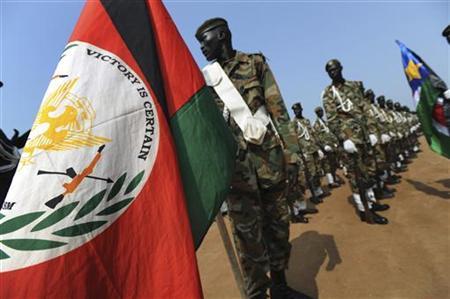Sudan becomes first state to recognize independence of south
 Sudan became the first state to recognize the independence of its oil-producing south on Friday, smoothing the way for the division on Saturday of Africa's largest country into two but not dispelling fears of future tensions between them.
Sudan became the first state to recognize the independence of its oil-producing south on Friday, smoothing the way for the division on Saturday of Africa's largest country into two but not dispelling fears of future tensions between them.
"The Republic of Sudan declares that it recognizes the state of South Sudan from July 9," Khartoum's Minister for Presidential Affairs Bakri Hassan Saleh announced on state television.
Sudan entered its last day as a united nation with rumblings of conflict along its north-south border and international concerns for the future stability of the huge, fractured and largely impoverished territory that straddles Arab and sub-Saharan Africa. But looming independence already sparked celebrations across the south with many seeing it as a moment of liberation after years of fighting and perceived repression, dating back to raids by Arab slave traders.
World leaders started to arrive on the eve of independence, including UN chief Ban Ki-moon. "The people of south Sudan have achieved their dream. The UN and the international community will continue to stand by south Sudan. I am very happy to be here," Ban told reporters at the UN airport in Juba.
Earlier in the day, processions of ex-veterans, soldiers and civilians, including women's groups, marched through the city centre in the hot sun, some dressed in traditional clothing, playing drums and dancing.
Information minister Barnaba Marial Benjamin insisted, however, that preparations were on track for Saturday's celebrations, when millions of southern Sudanese, and foreign dignitaries including 30 African leaders, will mark the birth of the world's newest nation. The main ceremony will include military parades, prayers, raising the newly proclaimed Republic of South Sudan's flag and the country's first president, Salva Kiir, signing the transitional constitution.
Sudan's President Omar al-Bashir, a key guest at the independence ceremony, repeated his claim to want a secure and stable south on Thursday, while adding that good future relations between the two countries depended on secure borders and non-interference in each other's internal affairs.
Southern officials have said that Bashir, who is wanted by the International Criminal Court for alleged crimes against humanity and genocide in Darfur, will be the main guest of honor. But French Foreign Minister Alain Juppe, who is also due to arrive on Saturday morning, said he would try to avoid an encounter with Bashir by remaining among other international dignitaries such as British Foreign Minister William Hague. "Just because Bashir is there does not mean that we should not show our support" at the independence ceremony, Juppe said on Thursday.
